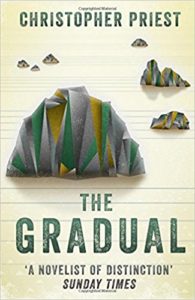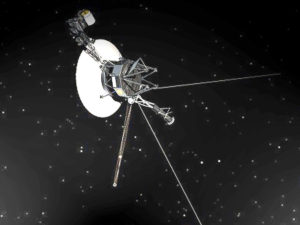
By Paul Kincaid
The Gradual — Christopher Priest (Gollancz)
 The other day, when I was reviewing Good Morning, Midnight by Lily Brooks-Dalton, I noted that it was one of two books I still had to write about from my initial list that hadn’t made either the Sharke Six or the official Clarke Award shortlist. I then proceeded to detail why I thought the Brooks-Dalton hadn’t made the lists (it’s not really very good science fiction).
The other day, when I was reviewing Good Morning, Midnight by Lily Brooks-Dalton, I noted that it was one of two books I still had to write about from my initial list that hadn’t made either the Sharke Six or the official Clarke Award shortlist. I then proceeded to detail why I thought the Brooks-Dalton hadn’t made the lists (it’s not really very good science fiction).
This is the second, and the reasons The Gradual didn’t make either list are, well, I don’t know.
No, that’s not fair. The reason it didn’t make the Sharke Six is clear enough: it could appear like a conflict of interest, given that Nina Allan, who set up the Shadow Clarke Award jury, is Priest’s partner. But the Shadow jurors made it perfectly clear that in other circumstances the book would have made our list. And I think pretty well all of us expected it to be on the official shortlist.
But it wasn’t, so I am left trying to work out why not.
Right back at the start of this process, when I introduced my initial list, I gave one possible reason why it might not be chosen. I said then that whether it made the shortlist “could depend on something as simple as whether the judges come to it early in their deliberations or late. Because what I find most interesting about this novel is what comes after you have closed the book. It was only after I had finished reading that I found the book lodged insidiously in my memory, unfolding and revealing more in retrospect than I was aware of at the time.” Looking back, that is far too simplistic. The quality or otherwise of a book can be judged pretty much as you are reading it, even if some of the deeper resonances don’t become apparent until later.
I do wonder, though, in an extension of this point, whether the problem might be lack of time to re-read? Let’s face it, Priest is an incredibly complex writer whose work is so carefully structured that it is often only on re-reading that you spot a reference casually dropped two chapters in to the novel that affects our understanding of something that happens two chapters from the end. It was, for instance, only on re-reading The Separation that I noticed that one sentence, relating to a character in an ambulance, is repeated word for word in a very similar scene some 200 pages later. But everything that has happened in the interim means that this sentence has a very different affect the second time around, and that makes us go back and reassess our understanding of the earlier scene. And how many of us, reading The Prestige for the first time, failed to take literally Borden’s assertion that what he wrote was a lie, “even the first word”? That first word, of course, is “I”.
In the year that The Separation won the Arthur C. Clarke Award, one of the judges remarked that every time they re-read the novel it was like reading a different book. This was because, on each new reading, you notice things you missed the first time, or pick up on references that only become apparent when you know what comes later in the book. This is a persistent feature of Priest’s work. I have lost count of the number of times I have re-read The Affirmation, but every time I revisit it I will come across something in the novel that takes me by surprise. If a book does not fully unpack its qualities on first encounter, how can we expect award judges, given the time constraints they are under, to fully appreciate those qualities?
As it happens, commitments of my own have meant that I have not had a chance to give the novel the second reading I intended. In consequence, it feels as though I have only read half the book. Still, I got a thorough enough understanding of its complexities and challenges to understand how innovative it is, how fully it deserves a place on the award shortlist. But maybe that’s just me.
Casting around for other possible reasons why the book was not shortlisted, it occurs to me that I have seen the Dream Archipelago described as fantasy, and wonder therefore if the judges simply decided it was not science fiction. That’s not so easy to deal with as it might look, since the distinction between fantasy and science fiction is not a fixed and recognised barrier but rather a flexible and ever-changing system of tastes and personal preferences. But I note that The Adjacent was shortlisted for the Clarke Award, so one jury at least decided the Dream Archipelago was science fiction.
However, The Adjacent, like The Affirmation before it, is a novel in which there is a crossover between this world and that of the Dream Archipelago, which means that one can be seen as an avatar or a mirror of the other. But The Islanders, which won the BSFA and John W. Campbell Awards, and which is surely one of the most awesomely rich and inventive novels of recent years, was not shortlisted for the Clarke Award either. Like The Gradual, The Islanders is set entirely within the Dream Archipelago, there is no psychic or psychological link between the two worlds, you can’t get there from here. Does that, therefore, make them seem more like secondary world fantasies? It is presumably in the eye of the beholder.
All I can say is that, ever since the very first Dream Archipelago story, “The Negation”, I have read these works as acute and insightful accounts of human weakness and failure. The complex interplay of islands serves not just as a backdrop against which these human traits are made vivid, but also as a lens through which the humanity of the characters is enlarged for our detailed examination. It is the foreground characters that matter, not the colour or glamour of the background. And this is something that I associate more readily with science fiction than with fantasy.
This is as true for The Gradual as it is for all the other Dream Archipelago stories. Which is why I find it difficult to see this novel as anything other than science fiction.
Okay, maybe (and I’m starting to struggle here) the novel isn’t science-fictional enough. Or the central science fiction idea is dealt with too obliquely. Hmm, Priest is never anything but oblique in the way he deals with sf tropes. Fugue for a Darkening Island is an invasion story, but not in the way that sf usually approaches invasion; The Glamour is a story of invisibility, but a form of invisibility that owes nothing to H.G. Wells. So yes, oblique, or at least using the trope in a way that we might not expect. I thought that was supposed to be a positive, that novelty was meant to be a strength, indeed a defining characteristic, of science fiction.
The Gradual is a time travel story, an archetypal science fiction trope that is well over 100 years old. But the way it is used here is disturbingly different from how time is generally employed within sf. Time eddies and fluctuates and swirls about the islands of the Dream Archipelago. This isn’t an entirely new concept, the idea of time vortexes came up in Priest’s short story, “The Equatorial Moment”, and gets a passing mention in The Islanders, but this is the first time he has focussed upon the phenomenon and its consequences.
The central character, Alesandro Sussken, is a talented musician and composer born and brought up in one of the nations of the northern continent. His country is locked in a perpetual war with one of its neighbours, but the war is fought out on the uninhabited southern continent, beyond the more-or-less neutral islands of the Dream Archipelago. Because the war is out of sight and out of mind, it has little immediate effect upon the everyday lives of Sussken’s countrymen, except that there is a totalitarian regime, and every so often young men are drafted and shipped away to fight, seemingly never to return. Sussken escapes the draft, though his brother does not, and builds his career. His work is largely inspired by the islands of the Dream Archipelago, a couple of which he can glimpse on the horizon but they remain objects of desire forever out of reach. Then, out of the blue, he is invited to join an orchestral tour of the Dream Archipelago.
In the earliest Dream Archipelago stories the islands were places of sexual allure and peril, places of warmth and ease where it was tempting to throw off inhibitions. When Priest returned to the Dream Archipelago with The Islanders, the character of the islands had changed, they were more variable, often colder, more workaday. But the islands that Sussken encounters on that first tour revert to the earlier model, places of warmth and relaxation and sexual pleasure. He is seduced. But when the tour ends and he returns to Glaund City, he finds that much more time has passed than could be accounted for by the duration of the tour.
This, something like halfway through the book, is our first indication that time travel is involved in the story. But we shouldn’t be totally surprised by this, after all, we were told on the very first page:
When I went in pursuit of my tormentor, I became an inadvertent traveller in time.
Time is a gradual process – like aging, you do not notice it happening.
Priest has a liking for baldly stating things at the start of his novels that the reader doesn’t really pay attention to until much later. That’s why re-reading his books always pays dividends.
But it is not just stated; it is implicit in everything from the very first words of the novel:
I grew up in a world of music, in a time of war.
There is something disingenuous in that sentence, as if the pairings are the wrong way round. War shapes the world; time shapes the music. But music is time: time signatures, tempo, the sequences of sound and silence from which all music is built. The fact that Sussken is a musician is integral to the fact that this is a novel about time. The curious curlicue journeys that Sussken must undertake in the latter part of the novel to compensate for the gradual are musical shapes as much as they are temporal shapes. So, if we are paying attention, we know that this is a novel about time travel long before Sussken slips through time. But of course we’re not paying that much attention, or at least we’re not paying attention to the right things. We see the musician achieving fame, we see the lure of the islands, we see the search for the rock musician who has reinvented Sussken’s classical compositions, we see the familiar images of love and loss and sex and defeat. But these are distractions on the surface, they are not the bass note of time that underpins the whole novel.
Yes, this is a novel with a straightforward, familiar, well-used science fiction trope at its heart. But that trope has been reinvented, changed into something else, given a different rhythm. And then it has been hidden in plain view. We like our science fiction to be new and familiar at the same time, and that is exactly what Priest has given us in this novel. But the familiarity has been distorted and the newness is radical. If we don’t read The Gradual as science fiction, maybe it’s because we’re not reading The Gradual.
Or maybe the problem is that it is too radical. Looking back, The Islanders was not shortlisted for the Clarke Award, though that was a tour de force of radical innovation. Last year, The Thing Itself by Adam Roberts was not shortlisted, though it was clearly the most sustained and successful reinvention of science fiction that we have seen for some time. Maybe radical is no longer what we want our science fiction to be?
Or possibly the jury just didn’t think it was very good. Well, it may not be up there with Priest’s very best novels, The Islanders, The Prestige or The Affirmation, but that’s rarefied territory, not much does achieve those heights. But as a work of literature The Gradual is at least on a par with The Extremes, which was shortlisted for the award; or The Adjacent, which was shortlisted for the award; or The Separation, which won the award.
So no, in the end I don’t know why it didn’t make the list.
*
Paul Kincaid was one of the founders of the Arthur C. Clarke Award; he served as a judge for its first two years, and administered the Award from 1996 to 2006. He co-edited The Arthur C. Clarke Award: A Critical Anthology with Andrew M. Butler. He has contributed to numerous books and journals, and is the author of two collections of essays and reviews: What It Is We Do When We Read Science Fiction and Call And Response. His book on Iain M. Banks is forthcoming from University of Illinois Press. He has received the Thomas Clareson Award from the SFRA, and the Best Non-Fiction Award from the BSFA.
>> Read Paul’s introduction and shortlist.
3 Comments
-
When I reached the end of The Gradual, I flipped back to that opening sentence and realized that, once again, Priest gave away right at the start how the novel was going to work, and then kept me from seeing it until I was most of the way through.
I don’t understand why it didn’t make the Clarke list either.
-
Every time I read a Priest novel I pay attention to the first sentence. And every time I forget what it says until I’m a long way into the book. I wish I knew how he did that.
-
No, it was an accident, and I can tell you why privately.


